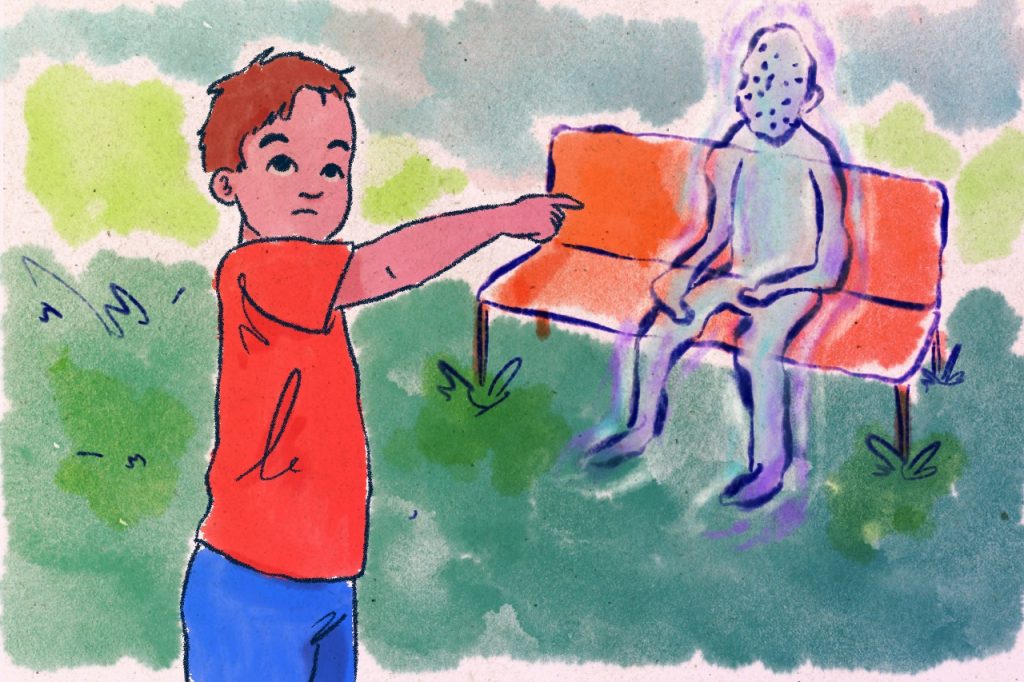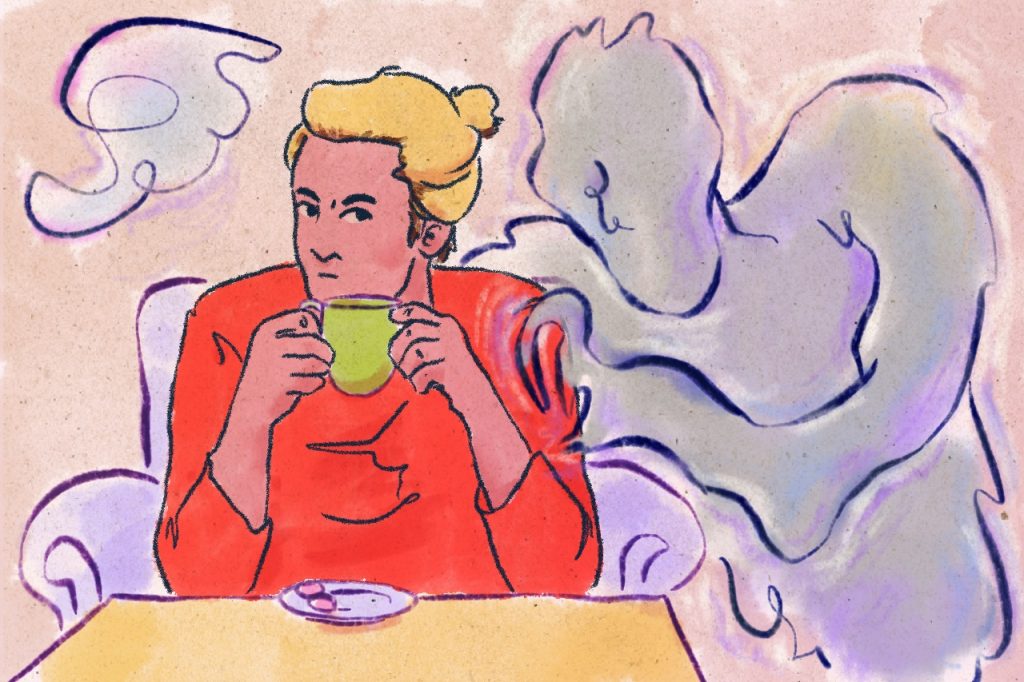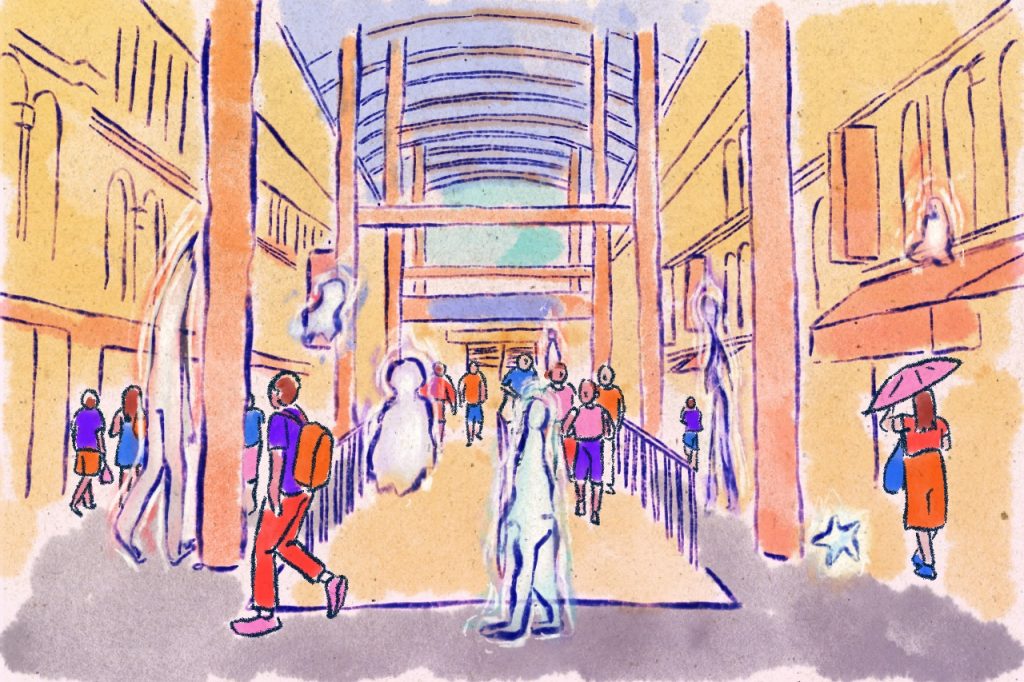Top image: Ansh/Rice Media
“In this world, nothing can be said to be certain, except death and taxes”, as the often misquoted Benjamin Franklin line goes.
Humans structure their lives on the inevitability of it—death, I mean; people can evade their taxes.
For the non-religious among us, spiritual philosophies can range from the tedious grip of “Kiasi” (fear of dying) to the youthful mantra of “YOLO” (You Only Live Once). Still, for those who believe in an afterlife, perhaps the fear of death can be allayed with platitudes of a better place or being born again.
Whatever the case, most of us have formed some type of relationship with the idea of death. We live our lives vaguely, if not actively weary of it, because despite whatever religious institutions you believe, no one can empirically tell you where you go after you die.
Well, except for CT. After all, CT sees ghosts.
Meeting a Seer in a cafe
From his WhatsApp profile photo, I expected a fashionable, put-together young gentleman with black hair styled in a trendy cut.
Instead, CT walked into The Moon café red-eyed with wet, bleached blond hair. He was tall, skinny, handsome, and he bounded into the front-of-shop area with both a skittish yet strangely exuberant energy. It’s hard not to feel entranced.
He was 30 minutes late, hence the red-eyes (from waking up late) and wet hair (from a hurried shower). I didn’t mind; it wasn’t every day you get to speak to someone with a third eye. He was my age too, 22, or 21 as I would later learn—his birthday was the next day.
“Paiseh, ah,” he said to me as he made himself comfortable at our corner seat.
“No worries,” I replied with a laugh. I could tell he would be fun company.
He ordered an iced matcha latte. “I’m very basic.”
From what I saw, that description was not too far off. Seated across me was a young adult in a man-bun, wearing a long-sleeved shirt that bore the image of Disney’s Stitch on the front. If it were any other day, he would have blended right into the background of this café-bookshop-tarot concept store.

In a world, one man can see ghosts
“Ever since I can remember, I’ve been able to see them,” he shared.
“From a young age?” I clarified.
“Yeah, young age. Even the parts where I cannot remember right—you know the childhood times—my parents, my family, would always freak out. They told me I would always walk around and say, ‘Why here got something?'” he recounted with an uplifting chuckle.
He then went on to share a time when he was at the playground with his mother. They were alone. Or so his mother thought.
Amid his playground mischief, he ran to his mother, sitting at a nearby bench and told her that they should leave. When she asked why, he said, “na bian you yi ge lian pokpok de,” he gestured to the bench beside his mother’s.
Over there, there is a person with bumps on their face. They left immediately.
“Actually, got a lot, ah. I just need to recall. There are so many. To me, it’s just everyday things.” He said casually. “But there was a time I stopped seeing. My parents went to bring me to close it. There’s this ritual to go and close it one. So I didn’t see any ghosts until around 6-7 years old.”
But gradually, the effect wore off. CT started seeing faint shapes he made out to be ghosts, thinking at first that they were merely illusions. He remembers seeing shadow figures running past, sometimes appearing rather abruptly.
“That time, I thought I was going crazy. I was like, ‘what’s this?’, but then slowly it became more and more permanent. Then I told my parents about it. They said, ‘No choice, this one cannot do again one.'”
When I asked which ritual he was referring to, he told me it was a ritual they practised in Taoism, where you are given a talisman to tune your sixth sense down.
For CT, the body is like a robot or a machine, and the ability to see spirits was one of the ‘settings’ that could be switched off. He also believes that everyone has a third eye which they can ‘on’ if they want to.
Opening your third-eye
After a bit of Google search, I found literature that alludes to what he was referring to. Most links talk about the third eye—a concept in Hinduism, Buddhism, Shamanism, Taoism, and Western Esoteric traditions—located or depicted between one’s eyebrows.
In Hinduism, it is referred to as the sixth chakra—the energy centre, and for several religions, a focal point during prayer, meditation, and other religious devotions.
Many of the websites Google search led me to were, in fact, mindfulness and lifestyle websites that encourage one to open the sixth chakra or awaken the third eye through focused, intense meditation. One of the search results urged readers to visit a Taoist temple for a third-eye-opening Talisman.
I also found out that some people want the ability to “see-through” their third eye, not to see ghosts, but to unlock fortune-telling abilities for their benefit.
Most websites, however, refer to it as a centre of wisdom and intuition. Opening or accessing it would result in higher energy and focus or cause one to see visions in extreme cases.
“I always very guai lan one.”
CT tells me that the ghosts he sees align with the “seven emotions” employed chiefly in traditional Chinese medicine practice—grief, melancholy, fear, fright, anger, joy, and worry.
Rather than the traditional sense of ghosts as souls of people who have passed on, CT told me that he sees many different types of spirits.
The kind that adhered to the seven emotions manifested mainly as apparitions—parts of the soul that held specific emotional attachments.
“The apparitions have different colours. They are normally black or white. Then, if that person dies of sickness or is the depressed-type, it will be a bluish tint. I guess that’s why hospitals got a lot of blue colour apparitions.”
He then connected the dots between the light orbs commonly found in pictures and video to these apparitions, saying they were one and the same.
To him, they did not manifest as orbs. He saw their full figures, although they appeared as amorphous, three-dimensional shadows with vaguely human features like arms or legs.
“Did you watch Spirited Away? In the movie, you see the way the different spirits moved when they were at the restaurant, for instance. Something like that, but it’s not so clear lah. Like sometimes you can only see half the body.”
He describes two other colours—green and red. Green ghosts are vengeful, while red ones mean death is about to occur. He’d never seen a red one, but when he saw green ones, “I will siam“, CT says, referring to the Singaporean slang for when you make yourself scarce.

“Ghosts can’t enter homes”
As he was describing the apparitions, I found it hard to envision what he was talking about. Still, I can’t help but feel a tension in the air, my demeanour becoming slightly skittish, glancing at any out of place movement at the periphery of my vision.
It also didn’t help that CT had his hand rubbing the back of his neck as if there was something only perceptible to him breathing on it. It was no wonder he found ways to make light of the situation.
“I am always very guai lan one,” he repeated several times in our conversation, referring to the Hokkien slang for being annoying.
“I make direct eye contact with them. Some seers purposely act menacing. If not, the ghosts will come and ka jiao you, disturb you. Ask you to help them, all this kind of thing. I am very guai lan one I always like to go and tease them. They will be quite shocked. It’s amusing.”
In this instance of being “guai lan”, he was referring to another type of ghost—one that bore more of a resemblance to humans.
He refers to them as the main souls.
“The main soul is a combination of three ‘component’ souls—one will stay at the place you die, one will go back to wherever you come from, and one will go to the place you are buried. Three of these main souls make up the main you.”
He recalled two instances of seeing main souls. One was when he was walking to the bus stop on the way to school. He saw a girl who looked kind of odd, but he couldn’t figure out why. When she realised he could see her, she revealed to him how she looked when she died.
He later learned that there was a car crash in the area a few years prior, so you can probably imagine what he saw. Despite this, he said he stared her down, pointedly annoyed that she was bothering him.
“I’m used to it,” CT claimed.
Another instance was less amusing. A lady’s main soul realised he was a seer and followed him home. Ghosts can’t enter homes. Still, he quickly asked his mother to open the door to let him in.
Unfortunately, he had formed an emotional connection with the woman and understood that she was in agony from reuniting with her family. He remembered breaking down in tears, regretting that he didn’t have the skills to help her.
Main souls and the meaning of life
He explained that main souls didn’t usually have emotions—they are simply empty shells of what they once were.
“Spirits are never the manifestation of a person. So if a person dies, and you see a spirit of them, don’t get too attached to it. It’s not really that person. It’s only a part of that person. That incomplete portion of the person simply manifested because there was something that the main soul had an attachment to on earth.”
He explained that if a main soul had strong emotions, they were faced with a host of problems or something tragic happened to them.
Most ghosts he could handle or ignore, but these instances left him pondering the inevitability of death and the meaninglessness of it. People without his ability have the luxury of ruminating about dying and deciding to make life meaningful because of it. The uncertainty of death allows them to hope that life will be significant.
But to CT, certainty isn’t just in death—the consequence of death is. It doesn’t allow him much wiggle room to make meaning out of life.
“I will never consider suicide an option because your problems don’t end there. If there’s a life after death—and from what I see, there is—your problem is just going to increase. It’s just going to be more troublesome. At least over here, you’re whole. So if you want to heal, you can heal properly. If you die already, ah, you are everywhere, fragmented, all in broken pieces. How are you going to come back together?”

Life goes on, though it still sucks sometimes
Nevertheless, hope perseveres. CT says that this ability to see ghosts was why he chose Social Work as a major in University. He is currently a second-year undergraduate at the Faculty of Arts and Social Sciences (FASS) at the National University of Singapore (NUS).
“It’s very depressing to see so many people with so many issues. And after they die, their issues never end. Also, it’s unfortunate to see so many people suffering after they die. I just hope to make a small difference.”
This extends to those he hopes to help with his social work practice and the people close to him. He has tried to use his seer ability to help the friends around him as well. However, something as contentious as the clairvoyant and supernatural would naturally drive some people away.
“I have told people before. I will tell them, ‘eh ni xiao Xin ah, ni yao chu shi qin Liao.’ Be careful; something will happen to you. Then if it happens, they say I curse them; if it doesn’t, then, they say I lied.”
I can’t say I blame them.
I like CT. He’s funny, kind, intelligent and by all manner of appearances, just like everyone else. He cares about how he looks, involves himself in the trends, and wants to feel liked by people.
Despite these efforts, people fear what they don’t understand, no matter how presentable the messenger looks. If people don’t believe you, they think you’re either crazy or that you cursed them. It’d be hard to feel optimistic about your relationship with people.
“When you can see, then you view life very differently. When you view life very differently, then you just feel like everyone doesn’t understand you. It’s the loneliness lah, it’s the loneliness that comes.”
The burden of human relationships
I asked him if it was hard for him to maintain close friendships.
“I don’t have any close friends. It’s more like, I’m lazy, I don’t bother to maintain. But I’m always there, lor, that’s all. When I meet them, I’ll kind of know how they are doing. But still, their worldview is very different.”
“Are you okay with that?” I asked.
“I’m okay.”
“Have you always been okay with it?”
“No. But I learn to be okay, ah. I realise that I don’t need people’s approval to live my life. I have all the spirits to accompany me. Really really.”
“But does that substitute for friends?”
“At least they are transparent. If they are angry, they are angry. If they are happy, they are happy. If they are voidless, they are voidless; I don’t need to care too much about it. They are just there. Humans are much more complicated.”
“Does that mean you don’t have the desire to connect with someone?”
“Not that I don’t have the desire. I’m not a loner to that extent. It’s more like, if there’s no need to, then I don’t want to. If it’s for superficial friendship or connection, then I’d rather stay home.”
He paused, then caveated.
“I still like to listen to what people, my friends, have to say. But it’s more like I cannot really enjoy the happiness with them or anything because I don’t understand.”
“You don’t understand happiness?” I probed.
“No, I don’t understand why they feel happy. So like, I’ll be happy, lah, happy for them. But if you ask me, ‘Does that make you want to get into a relationship?’ I will say no. At this point, I have no desire. I feel like an empty shell. Because everything is meaningless anyway.”
“Since you already know the secrets to the universe?”
“No lah. Not secrets to the universe, more like, we’re all going to die, anyway. The more expectations I have, the more attachments I have, and the more apparitions I’m going to leave. I just want to leave this world completely as a whole. I don’t want to leave anything behind.”
“You don’t want happiness?” I asked, perplexed at the direction this conversation seemed to be heading.
“If there’s happiness, that means there’s sadness.”
“But won’t you want to feel the sadness so you can feel the happiness?” I offered.
“Oh, I’ve experienced enough sadness in this life. Every day I just live day by day.”
Questions of sanity
I ventured the question: “Have you ever questioned if the ghosts you see are really there?”
“Have. I got thought I siao before. When I was young, I thought I was crazy. Luckily, my cousins are people that can see spirits like me, so I’ll confirm with them. We’ll ask each other, ‘Really there ah?’, ‘Yeah, really there.’ Okay, then I know I’m not crazy.”
“If twenty plus people can see them, then I cannot be imagining things, right? Plus, I’m a psychology student; I don’t think I’m crazy. I’d know,” he emphasised, referring to the psychology studies Social Work majors have to study.
Understandably, sceptics will be sceptics. I am a sceptic, and yet, I want to believe the things he shared. He would consider himself a sceptic, at least of his religious leanings, but he can’t help what he sees.
It almost doesn’t matter, at least for this story, whether what he sees is real or not. According to his philosophy, life happens, death happens, and the only thing you can do is decide who you want to be when you are still living.
That’s not that much different from how the rest of us non-seers live our lives. It turns out YOLO is as much a truism as it is a phrase to be plastered on trucker hats from the 2010s.
“I think you don’t have to believe in Christianity or God or whatever, but what Jesus said are still very good things. Do to others what you want others to do to you. I am fortunate to say that although there are many bad people in my life, there’s also a lot of kind people that made a difference, so yeah, I also want to be a kind person—to the living, ghosts, and the dead. I can only hope that that’s enough.”






